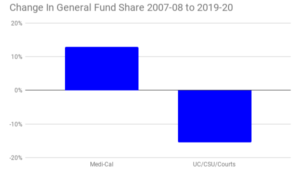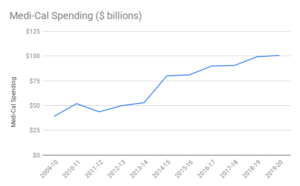Medi-Cal is an entitlement to health insurance provided to low-income Californians. With 13 million customers, Medi-Cal is a voucher-type system funded by a combination of the state and federal government. Spending on Medi-Cal in the fiscal year starting July 1 is projected to be $102 billion, $23 billion of which is projected to come from the state’s General Fund.
General Fund spending on Medi-Cal disproportionately burdens spending on discretionary programs such as UC, CSU and courts. That’s because most other General Fund expenditures are constitutionally protected (eg K14, debt service) or contractually protected (eg pensions and other post-employment benefits for retired state employees), and while Corrections spending is neither constitutionally nor contractually protected, it is politically protected by powerful lobbies. That leaves discretionary programs such as UC, CSU and courts to absorb the consequences, leading to declining shares of the General Fund:

Governor Newsom has proposed making Medi-Cal available to young adults ages 19 through 25 regardless of immigration status. Despite the risks to discretionary programs, Govern For California supports that expansion. That’s because 75 percent of those to be added under the governor’s proposal are currently on Medi-Cal and an expansion of full-scope coverage to that age group is expected to cost the General Fund only $74 million.
But a State Senator has proposed an amendment that would make Medi-Cal available to all Californians regardless of immigration status, proposing to immediately add those aged 65 and over and those aged 26 to 64 over time. That expansion would cost >$3 billion per year, an amount equal to 30 percentof the annual funding currently allocated to UC, CSU and courts. Because the expansion would be an entitlement, a recession in state revenues would force additional cuts to UC, CSU and courts. We oppose that amendment — as should anyone who cares about sustainable funding for UC, CSU, courts and other discretionary programs.
Meanwhile, legislators who care about the health of Medi-Cal’s customers should read a recent National Bureau of Economic Research study, which reports a doubling in Medi-Cal spending enriched hospitals but not patient health.

Worse, emergency room use went up.
The legislature and governor must reform a Medi-Cal system that currently produces better profits but not better health. We believe that starts with expanding the scopes of practice permitted nurse practitioners, physician assistants and nurse midwives, rewarding excellent and punishing poor hospital performance, evaluating Maryland’s global hospital budgets policy, and using machine-learning and social services to intervene before costly medical treatment is required. No doubt there are other ideas but one way or another, the state must get better health for the $100 billion per year it’s already spending on Medi-Cal — and certainly before it further decimates funding for UC, CSU and courts.
The legislature should reject the amendment to Senate Bill 29 and turn its attention to making Medi-Cal work.

